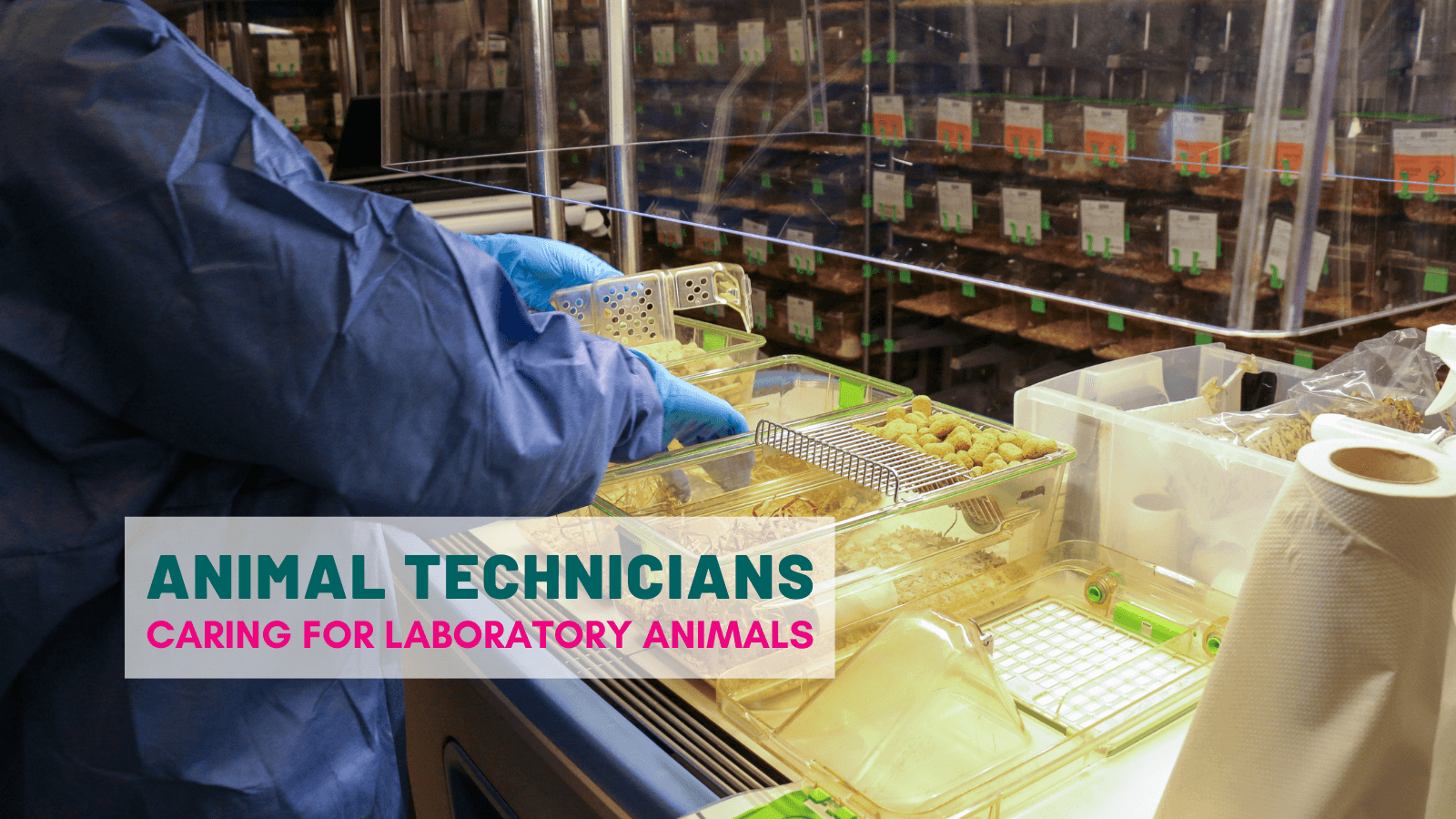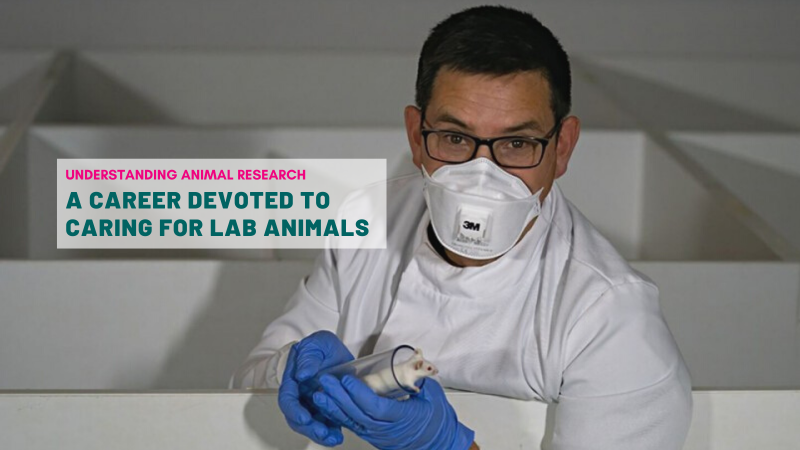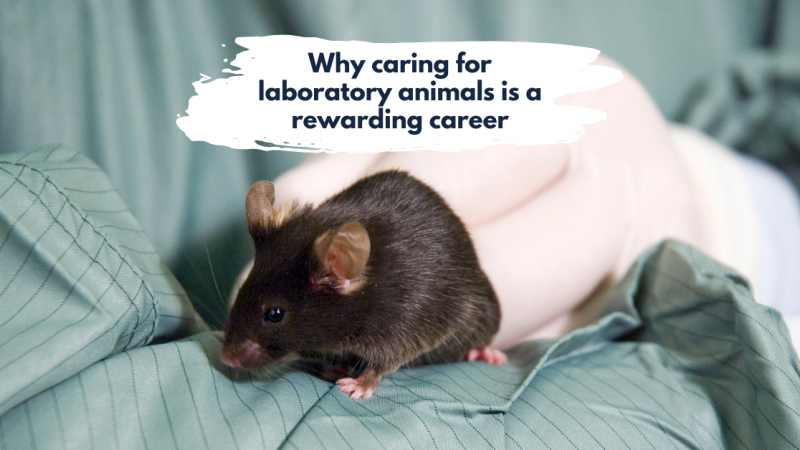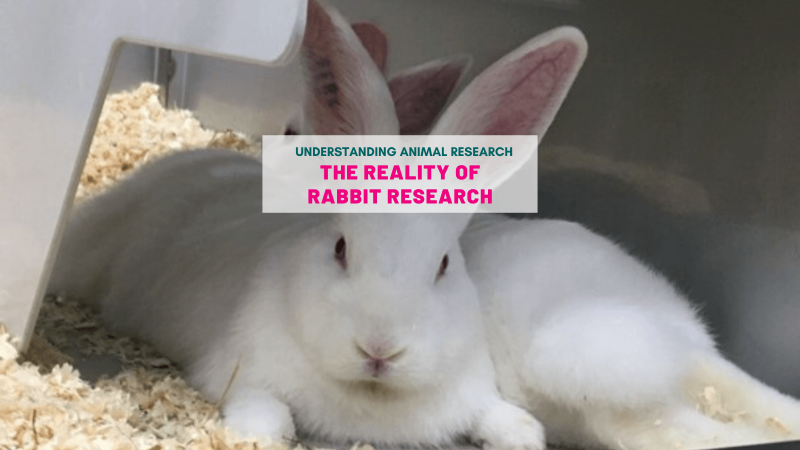
Animal technicians
One of the first questions that comes to mind when talking about laboratory animals is how are they looked after? Do they receive the same care as pet animals or animals on a farm? In the UK, laboratory animals are cared for by specially trained Animal Technicians.
The care of laboratory animals is one of the most highly regulated areas of animal care in the UK. Animal research in the UK is regulated by it’s own legislation, the Animals (Scientific Procedures) Act 1986 (ASPA). Laboratory animals are only cared for by people who have been specially trained in the specific care needs of laboratory animals, these people are known as animal technicians and animal technologists, depending on their level of training.
In the UK, the Institute of Animal Technology (IAT) provides training and workshops for animal technicians across the country. The IAT is the UK’s leading professional body for animal technologists and they are dedicated to advancing and promoting excellence in the care and welfare of animals in research.
What type of person becomes an animal technician?
As with most animal care jobs, animal technician roles are usually filled by people who already have a passion for animal care and welfare. Animal technicians can come from all walks of life and backgrounds, but there is one thing they have in common, a love of animals and a dedication to their care and welfare.
Some people would say that simply working in an animal laboratory means that you must not care for the wellbeing of animals, because the nature of scientific research does result in harm to the animals, but this isn’t the case.
Senior Animal Technician, John, from Newcastle University says “People think that to do animal testing, you’ve got to be cruel to animals. But on the contrary, you’ve got to love them. That’s the precursor, everything else is secondary. In fact, 99.9% of techs I know are absolute animal lovers and have animals at home. I know colleagues that own chickens, goats and even lizards.”
Read more about John’s experience of working in laboratory animal care in “Why caring for laboratory animals is a rewarding career”.
Chief Animal Technician at the University of Liverpool for 30 years, John Waters used his experience to promote new welfare advances across the sector, such as the now common practice tunnel handling method. In an interview with UAR John states:
“I think most - if not all - technicians wouldn’t use animals in research if that was an option. Unfortunately, in the current state of things, there are no alternatives to using animals in research. I devoted my career to giving those animals the best life they could possibly have. I put my heart and soul into looking after these animals, and pushing for positive welfare improvements.”
Read more about John's experience working as an animal technician in UK laboratories in "A career devoted to caring for lab animals".
What do animal technicians do in the laboratory?
Animal technicians are the primary carers of animals in the laboratory, they are responsible for their care and welfare and carry out the following duties:
-
Ensuring animals are provided with the appropriate amount and type of food
-
Ensuring animals have access to clean, fresh water
-
Providing animals with species appropriate enrichment activities for mental stimulation
-
Checking the animal's health and taking the appropriate action depending on the situation
-
Ensuring animals are housed in the correct environment
-
Ensuring high standards of hygiene are maintained in the laboratory
-
Managing breeding colonies of animals
-
Maintaining strict records as required under the Animals (Scientific Procedures) Act 1986 (ASPA)
Animals live in the laboratory 24 hours a day, 365 days a year, and the time that animal care staff spend with them reflects this. Animals must be checked each day to monitor their health and ensure that their needs are being met, which means animal technicians are usually on site each day. During the Covid-19 pandemic, animal technician’s were classified as key workers and continued to travel to their workplaces throughout the lockdown period to care for the animals. Thanks to the dedication of animal technicians, researchers, and all key laboratory staff members during the pandemic, multiple vaccines against Covid-19 were developed and licensed rapidly in the UK. It has been estimated that Covid-19 vaccines ‘saved 20 million lives in one year’.
The different roles and responsibilities of Animal Techs
In the UK, most lab animal carers will start as a Trainee Animal Technician and will be required to undertake a qualification in Laboratory Animal Science & Technology in order to become a qualified Animal Technician. Once qualified, technicians may undertake further qualifications in Laboratory Animal Science & Technology to progress to more senior roles.
Trainee Animal Technicians
Trainee Animal Technicians carry out their duties under the supervision of qualified Animal Technicians and other senior roles.
Animal Technicians
According to the Institute of Animal Technology, Animal Technicians will have a minimum of 2 years experience in a laboratory animal environment and whilst not licensed under the Animals (Scientific Procedures) Act 1986, they have a sound understanding of the requirements of the Act and routine experimental procedures. Animal Technicians are familiar with the care, welfare and day to day husbandry of animals in the laboratory.
Registered Animal Technologist (RAnTech)
The Register of Animal Technologists was established in 1985 to promote professionalism in laboratory animal care and enhance standards of animal welfare. Registered Animal Technologists will have completed the relevant level Diploma in Laboratory Animal Science & Technology and a minimum of five years experience working in a relevant field.
Registered Animal Technologists work closely with scientific researchers to support the planning of their research project and the day to day requirements of the experiment, in regards to animal welfare. Animal Technologists are competent at performing regulated procedures (such as taking blood and DNA samples) and may also be involved in training other members of staff.
Senior Animal Technologist
Senior Animal Technologist’s are responsible for managing the animal technicians in their facility, they work closely with scientific researchers to ensure that animal welfare is a priority, enforce high standards of animal care and welfare and may also be appointed as a Named Animal Care and Welfare Officer (NACWO).
Senior Animal Technologist can complete further study in Laboratory Animal Science & Technology and may go on to become Facility Managers or fill specialist roles within the lab that require a high level of expertise in animal care and welfare.
Source: Institute of Animal Technology



